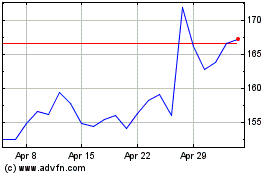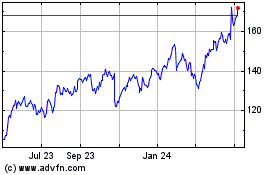By Yuka Hayashi in Washington and Sam Schechner in Paris
WASHINGTON -- The U.S. on Thursday suspended plans to impose
tariffs of 25% on French luxury goods in response to France's tax
on big tech companies like Facebook Inc. and Amazon.com Inc.,
saying it wants to coordinate its response with its efforts in
similar disputes with other countries.
The U.S. Trade Representative threatened to impose the tariffs
last year, in retaliation for France's 3% levy on certain revenue
from big technology companies, which the U.S. said unfairly
targeted American businesses. The tariffs had been scheduled to
take effect Wednesday.
The suspension of the tariffs on French products was welcomed by
U.S. importers and retailers that had criticized the such punitive
tariffs as a tool that aims to protect one industry at the expense
of another, while hurting American consumers.
But the decision also puts the onus on President-elect Joe Biden
and his administration to address increasing demands by other
countries for global technology companies to pay more taxes where
their customers are located.
"The Biden administration is being given the opportunity to
implement their own strategy on discriminatory digital taxes," said
Sen. Ron Wyden (D., Ore.), the likely next chairman of the Senate
Finance Committee. "America is going to have to respond. Many of
these unilateral taxes have been designed to target American
companies that are generating high-skill, high-wage jobs."
U.S. lawmakers in both parties have consistently backed the
Trump administration's approach as necessary for defending the U.S.
tax base.
In suspending the French tariffs, the USTR said its
investigations into digital-services taxes, or DSTs, in other
countries "have significantly progressed, but have not yet reached
a determination on possible trade actions."
"A suspension of the tariff action in the France DST
investigation will promote a coordinated response in all of the
ongoing DST investigations, " the USTR said in a statement.
The USTR has investigated similar measures by the European Union
and several countries since June. It announced Wednesday it has
concluded that the digital services taxes of India, Italy and
Turkey discriminate against U.S. companies.
The agency said it wasn't taking any specific actions for now
but that it would continue to evaluate "all available options."
Investigations into practices of the EU, Austria, Brazil, Czech
Republic, Indonesia, Spain and the U.K. continue.
Negotiations among the Organization for Economic Cooperation and
Development, a group of wealthy nations, to build a framework for
digital-services taxation have stalled.
That has led leading countries including France to implement
their own national measures targeting companies like Alphabet
Inc.'s Google and Amazon. France had suspended collection of its
digital tax in 2020 to allow for international negotiations, but
resumed collection in December.
The European Commission, which leads EU trade policy, had
previously said it was ready to issue retaliatory tariffs against
U.S. goods to support France.
On Thursday, Valdis Dombrovskis, an executive vice president at
the commission, said the bloc had taken note of the U.S. suspension
and was "willing to work constructively with the U.S. on finding a
timely global solution to the fair taxation of the digital sector."
But he added that the "EU stands ready to explore all options" if
the U.S. moves ahead with tariffs.
A spokeswoman for the French Finance Ministry said France had
not suspended its tax or offered any concessions to the U.S. French
officials have previously said they plan to push the Biden
administration to rescind the tariffs altogether, and that they
would rescind France's digital tax once there is an acceptable
global tax deal.
The French tax will bring in more than 400 million euro,
equivalent to $490 million, for 2020, officials say. India and
Austria have been collecting their taxes, and Italy, Spain and the
U.K., among other countries, have said that their digital-services
taxes will be payable in coming months.
Stephen Vaughn, a former USTR general counsel under U.S. Trade
Representative Robert Lighthizer now at King & Spalding LLP,
said the investigations conducted by the USTR into the DSTs should
give the incoming Biden administration "significant leverage in its
conversations with other countries."
"I think other countries will be well advised to engage
seriously with the United States on this topic." Mr. Vaughn
said.
The USTR, in a filing last year laying the groundwork for the
tariffs, said it is responding to the French tax, calling it an
"unreasonable or discriminatory" measure that "burdens or
restricts" U.S. commerce. France has responded that the U.S.
tariffs wouldn't be in compliance with World Trade Organization
commitments.
Jon Gold, vice president of supply chain and customs policy at
the National Retail Federation, applauded the decision to suspend
tariffs. The U.S. should seek to negotiate a comprehensive
agreement to address digital service taxes, he said.
While businesses, including tech giants, have largely opposed
unilateral taxes like France's, they have supported the OECD's
international negotiations on how to tax the digital economy.
Richard Rubin contributed to this article.
Write to Yuka Hayashi at yuka.hayashi@wsj.com and Sam Schechner
at sam.schechner@wsj.com
(END) Dow Jones Newswires
January 07, 2021 16:00 ET (21:00 GMT)
Copyright (c) 2021 Dow Jones & Company, Inc.
Alphabet (NASDAQ:GOOGL)
Historical Stock Chart
From Mar 2024 to Apr 2024

Alphabet (NASDAQ:GOOGL)
Historical Stock Chart
From Apr 2023 to Apr 2024
